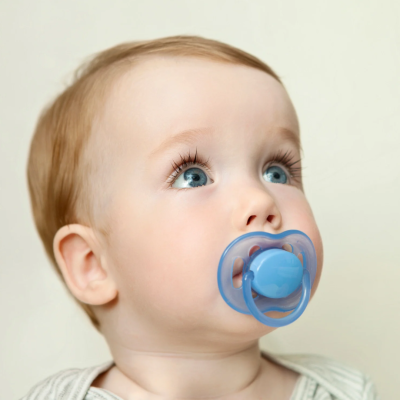Should You Use A Pacifier Or Avoid It Altogether?

Should you use a pacifier or avoid it altogether? Let us know your take on this hot button issue.
Answer our poll and get THREE bonus entries into our free Hatch Sound Machine giveaway!
Should You Use a Pacifier or Avoid It Altogether? What Canadian Parents Should Know
For new parents in Canada, one of the most common (and surprisingly controversial) baby topics is: Should you give your baby a pacifier, or avoid it altogether? While some parents swear by pacifiers as lifesavers during fussy moments, others are concerned about long-term impacts on dental health, breastfeeding, or sleep. So what’s the right call?
Let’s explore the pros and cons of pacifier use, what experts recommend, and how to make the best decision for your baby.
The Benefits of Using a Pacifier
1. Soothes and Calms Babies
Pacifiers can be an effective tool for calming a fussy or colicky baby. The sucking reflex is natural and comforting, and many babies find immediate relief with a pacifier.
2. May Reduce the Risk of SIDS
The Canadian Paediatric Society supports the use of pacifiers during naps and bedtime, citing research that links pacifier use with a reduced risk of Sudden Infant Death Syndrome (SIDS). Experts believe the sucking action may help keep airways open and prevent deep sleep cycles associated with SIDS.
3. Easier to Wean Than Thumb-Sucking
Unlike thumb-sucking, a pacifier can be taken away when it’s time to wean. This gives parents more control over the habit and often makes it easier to break.
4. Distraction Tool During Stressful Moments
A pacifier can be helpful during vaccinations, blood tests, or air travel. Sucking can help relieve pressure in a baby’s ears during flights and calm them in stressful environments.
The Risks of Using a Pacifier
1. Potential Nipple Confusion
If introduced too early, a pacifier can interfere with breastfeeding. Health Canada recommends waiting until breastfeeding is well-established (usually around 3 to 4 weeks) before introducing a pacifier.
2. Increased Risk of Ear Infections
Studies suggest a higher risk of middle ear infections in babies who use pacifiers frequently, especially beyond 6 months of age.
3. Dental Issues
Prolonged pacifier use—especially after age 2—can lead to dental problems like misaligned teeth or changes in the shape of the mouth.
4. Can Become a Sleep Crutch
If your baby relies on a pacifier to fall asleep, they may wake up and cry every time it falls out. This can disrupt both your baby’s and your own sleep.
When Is It Okay to Use a Pacifier?
Experts, including the Canadian Paediatric Society and the World Health Organization, generally agree that pacifiers can be safely used when introduced at the right time and weaned appropriately.
Here are some guidelines for Canadian parents:
Wait until breastfeeding is well-established (usually 3 to 4 weeks old)
Use for naps and bedtime only to reduce SIDS risk without over-dependence
Avoid coating it with sweeteners (even natural ones like honey, which is unsafe for babies under 1)
Keep it clean—sanitize regularly and replace pacifiers that show wear
Wean between 6 to 12 months to avoid long-term issues
What Canadian Parents Are Saying
On forums like BabyCenter Canada and CanadianParent.ca, moms and dads are split. Some credit pacifiers with saving their sanity during sleepless nights. Others prefer to avoid them altogether, choosing alternative soothing methods like rocking, swaddling, or white noise.
Every baby is different—and so is every parenting style.
Final Thoughts: Should You Use a Pacifier or Not?
There’s no one-size-fits-all answer, but if used wisely, pacifiers can be a helpful tool for soothing your baby and even protecting them during sleep. Just be mindful of when you introduce it, how long you use it, and when you start to wean.
Whether you’re on team pacifier or prefer other comfort methods, the best choice is the one that works for you and your baby.
Want more helpful parenting tips and baby product offers?
Join our CanadianParent.ca community for expert advice, free samples, and giveaways made for Canadian families.